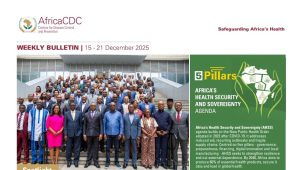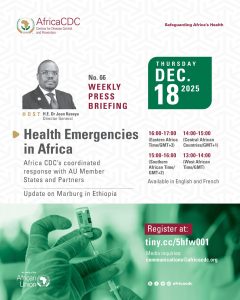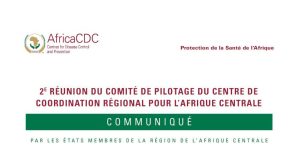When COVID-19 hit the Central African Republic in 2020, the state’s ability to deliver essential services was limited. Much of the Central African Republic was, and still is, highly inaccessible. Physical access to health facilities was constrained by the lack of roads — whether dirt or paved. Access to electricity stood at 8 per cent nationally and only 2 per cent outside Bangui, the capital. Worse still, the health system was not equipped to identify and report potential cases of COVID-19, nor was it prepared to care for those with severe and critical conditions. The problem is widespread across Central Africa, a region frequently besieged by public health threats.
Even today, there remains a lack of suitable infrastructure, which impedes movement across the region, particularly in transporting biological samples. There is low adherence to international safety regulations for packaging and labelling, and challenges in maintaining the cold chain, which lead to sample degradation and inaccurate results.
Several countries in the Central Africa region face major challenges related to the lack of harmonised protocols, efficient logistics systems, and limited biological risk management capacity.
“The recent experiences of our region – whether the COVID-19 pandemic, the mpox outbreak, the cholera affecting four of our Member States, or the recurring yellow fever epidemics – remind us of an essential truth: without an efficient, safe, and coordinated system for transporting samples, it is impossible to ensure rapid diagnosis and therefore an appropriate response,” said Dr Brice Bicaba, Director of the Regional Coordinating Centre for Central Africa at Africa CDC.
Given the situation, it was imperative to develop a coherent regional plan, taking into account local realities and international standards, to strengthen capacity for early detection and rapid response to health threats.
For two days in August, Dr Bicaba met in Libreville, Gabon, with country representatives from ministries of health, national laboratories, logistics and surveillance services, as well as technical partners from Cameroon, the Central African Republic, Chad, Equatorial Guinea, Gabon, and the Republic of the Congo. They worked to develop a comprehensive and integrated plan for the transportation of biological samples from peripheral areas to reference laboratories across the region.
“We now have the opportunity to take a decisive step forward in strengthening regional integration by working towards the definition and standardisation of a common approach for the integrated, safe, and effective transport of biological samples,” said Dr Bicaba.
After lengthy and detailed discussions, the meeting approved a strategy built around four main pillars. In terms of governance and regional coordination, an interstate operational mechanism will be established to strengthen collaboration, communication, and synergy between countries in the region.
Strengthening infrastructure and operational capacity will entail building the physical and technical foundations of an efficient transport system by assessing existing national systems, addressing gaps, and developing a secure network linking peripheral areas to reference laboratories.
Harmonisation of protocols and standards will ensure the quality and reliability of the entire process.
Strengthening human and institutional capacity will involve building a regional pool of mobile experts and enhancing the skills of staff involved at all levels of the transport chain.
Concrete actions were identified under each pillar. A network of national laboratories in Member States will be established and operationalised in countries that currently lack one. Countries in the region will be equipped with the logistical capacity to transport samples, while also supporting the implementation of quality management systems in reference laboratories, with a view to achieving ISO 15189 or ISO 9001 accreditation. Reference laboratories will be decentralised to intermediate and peripheral levels. There is also a plan to develop and implement strategies for sustainable domestic resource mobilisation.
“Given the challenges identified, it is now up to each country to contextualise and adapt the regional strategy to national realities, formalise laboratory networks, and ensure the sustainable functioning of integrated biological sample transport systems,” said Mr Mambu Mundunge, Deputy Director of the National Public Health Laboratory of Gabon.
The adoption of this regional strategy marks a decisive milestone in building resilient sample transport systems in Central Africa, said Dr Bicaba.
“It will not only improve epidemiological surveillance and diagnostic quality but also accelerate responses to cross-border health crises. The success of this initiative will depend on synergy between governments, local communities, and international partners to ensure equitable access to reliable diagnostic services and stronger preparedness for health emergencies,” he added.







